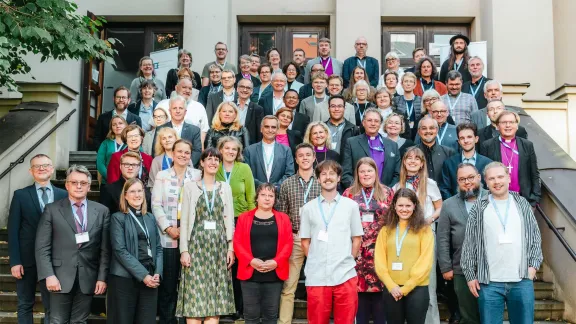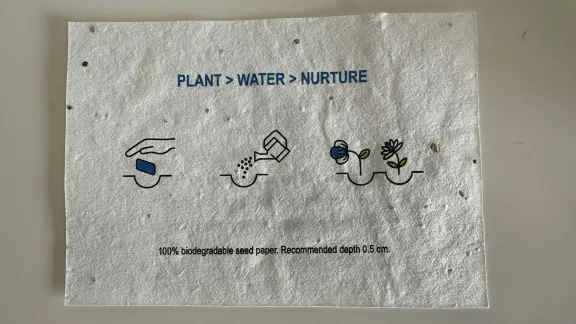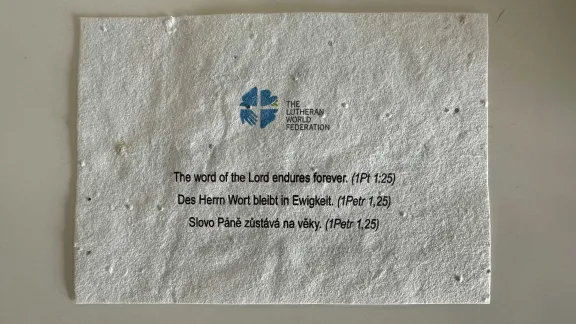
Delegates from LWF member churches across Europe attend the European Regions’ Meeting in Prague. Photo: LWF/Šárka Jelenová
At the European Regions’ Meeting in Prague, delegates are reminded of their mission to be communicators of hope
(LWI) - Delegates of member churches in the Nordic, Central Eastern and Central Western European regions of the Lutheran World Federation (LWF) gathered in the Czech Republic from 8 to 11 October to discuss challenges and opportunities they face within their pluralistic and increasingly polarized societies. Hosted by the Evangelical Church of Czech Brethren, the meeting was entitled ‘Lutheran journey in a changing European context’.
Discussions ranged from war and peace, spiritual growth and secularization, church state relations and the renewal of congregational life, as participants focused on the need to live into the words of German theologian and pastor Dietrich Bonhoeffer, written from prison, and become “church for others.”
Young delegates voiced growing concerns about the rise of populist governments and ideologies, calling on churches to follow in the footsteps of those who stood against 20th century totalitarianism and “speak truth to power” in contemporary contexts. Churches throughout the region were encouraged to be models of “ongoing Reformation”, trusting not in their own strength, “but in God’s promises of grace, mercy and reconciliation.”
Youth perspectives
Part of the program was dedicated to a presentation of the new LWF strategy, with a panel composed entirely of young delegates sharing their perspectives on the four priority areas of Thriving Churches, Responsible Theology, Justice and Peace, and Service and Dignity. Participants discussed the challenges of bringing this strategy to the grassroots level for effective implementation.
Reflecting back on last year’s Kraków Assembly, delegates explored ways in which that experience of global communion continues to inspire and shape the work of the churches in Europe today. For many, the landmark event was a vital experience of empowerment that continues to bear fruit, including among the Polish young people who served as stewards and volunteers. They noted that sharing worship and music from so many different countries was a powerful experience of communion, while the visit to Auschwitz served as a reminder of past atrocities, as well as the need to speak up for peace, justice and human dignity wherever they are threatened today.
Humanity is at risk in this region
Dr Fadi Atrash, CEO of Augusta Victoria Hospital in East Jerusalem
The Prague meeting also featured testimonies from three conflict zones, Ukraine, Palestine/Israel and South Sudan, where the LWF provides humanitarian aid and supports longer term development. Educational coordinator Maureen Ogutu shared her experience of working in South Sudanese refugee camps to bring hope and a future to girls as young as 12 who have been forced to marry and bear children, or boys “who have known nothing but guns in their life.”
Dr Fadi Atrash, CEO of the Augusta Victoria Hospital in East Jerusalem, talked of the impact of the war between Israel and Hamas, as well as the long-term effects of occupation on Palestinian patients and their families. “Humanity is at risk in this region,” he warned, adding that churches must continue to advocate for a ceasefire “so that the process of healing can begin.” Rev. Dmytro Tsolin, a Lutheran pastor and professor at the Catholic University in Lviv, spoke of the dramatically difficult task of talking about faith “against a backdrop of daily death and destruction in Ukraine.”

Paper cards containing “seeds of hope” to be planted and grown into flowers. Photo: LWF/Šárka Jelenová

Paper cards containing “seeds of hope” to be planted and grown into flowers. Photo: LWF/Šárka Jelenová
Representatives of the three European regions shared their perspectives on how contemporary wars and conflicts are perceived in their countries. They rejected any justification of ‘a holy war’, stressing the need to pray for peace and uphold the value of each human life. At closing worship, before participants headed back to their home churches, they received paper cards containing seeds to be planted and nurtured, a symbol of their mission to be effective “communicators of hope,” sharing the Gospel and planting seeds of peace and reconciliation among all people.
The European Regions’ Meeting took place in Prague, Czech Republic, from 8-11 October 2024. Delegates from LWF member churches in Europe gathered to reflect on the evolving Lutheran journey in today’s rapidly changing Europe. The meeting was hosted by the Evangelical Church of Czech Brethren.


